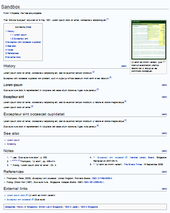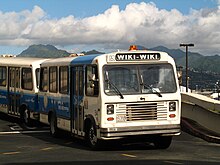User:0saids
Where Students are becoming the Teachers.
About Wiki
[edit]Wikipedia is a wiki, meaning that anyone can easily edit any unprotected page, and make any alterations visible to every other reader. You do not even need to register to do this. After your first edit, you will be a Wikipedia editor! Wikis may exist to serve a specific purpose, and in such cases, users use their editorial rights to remove material that is considered "off topic". Such is the case of the collaborative encyclopedia Wikipedia. In contrast, open purpose wikis accept content without firm rules as to how the content should be organized.

History
[edit]WikiWikiWeb was the first wiki. Ward Cunningham started developing WikiWikiWeb in 1994. It was named by Cunningham, who remembered a Honolulu International Airport counter employee telling him to take the "Wiki Wiki" shuttle bus that runs between the airport's terminals.

Cunningham was in part inspired by Apple's HyperCard. Apple had designed a system allowing users to create virtual "card stacks" supporting links among the various cards. Cunningham developed Vannevar Bush's ideas by allowing users to "comment on and change one another's text".
Despite Cunningham's usage of the term, the origins of the name wiki in commerce can be traced to the first U.S. Trademark on the name "wiki", which was filed a year before Ward Cunningham started developing WikiWikiWeb in 1994 by a company called WikiDigs in Van Nuys, California on July 12, 1993. The original trademark for "wiki" was used to describe a form of non-metal caps used for collecting and trading. However, the mark became abandoned by December 1994 because of a failure to use the mark in commerce, opening the way to widespread adoption of the term in the computer industry.
In the early 2000s, wikis were increasingly adopted in enterprise as collaborative software. Common uses included project communication, intranets, and documentation, initially for technical users. Today some companies use wikis as their only collaborative software and as a replacement for static intranets, and some schools and universities use wikis to enhance group learning. There may be greater use of wikis behind firewalls than on the public Internet.
Characteristics
[edit]The essence of the Wiki concept as follows:
- A wiki invites all users to edit any page or to create new pages within the wiki Web site, using only a plain-vanilla Web browser without any extra add-ons.
- Wiki promotes meaningful topic associations between different pages by making page link creation almost intuitively easy and showing whether an intended target page exists or not.
- A wiki is not a carefully crafted site for casual visitors. Instead, it seeks to involve the visitor in an ongoing process of creation and collaboration that constantly changes the Web site landscape.
A wiki enables documents to be written collaboratively, in a simple markup language using a web browser. A single page in a wiki website is referred to as a "wiki page", while the entire collection of pages, which are usually well interconnected by hyperlinks, is "the wiki". A wiki is essentially a database for creating, browsing, and searching through information.
A defining characteristic of wiki technology is the ease with which pages can be created and updated. Generally, there is no review before modifications are accepted. Many wikis are open to alteration by the general public without requiring them to register user accounts. Sometimes logging in for a session is recommended, to create a "wiki-signature" cookie for signing edits automatically. Many edits, however, can be made in real-time and appear almost instantly online. This can facilitate abuse of the system. Private wiki servers require user authentication to edit pages, and sometimes even to read them.
Editing wiki pages
[edit]There are many different ways in which wikis have users edit the content. Ordinarily, the structure and formatting of wiki pages are specified with a simplified markup language, sometimes known as "wikitext". For example, starting a line of text with an asterisk ("*") is often used to enter it in a bulleted list. The style and syntax of wikitexts can vary greatly among wiki implementations, some of which also allow HTML tags. The reason for taking this approach is that HTML, with its many cryptic tags, is not very legible, making it hard to edit. Wikis therefore favour plain text editing, with fewer and simpler conventions than HTML, for indicating style and structure. Although limiting access to HTML and cascading style sheets (CSS) of wikis limits user ability to alter the structure and formatting of wiki content, there are some benefits. Limited access to CSS promotes consistency in the look and feel and having JavaScript disabled prevents a user from implementing code, which may limit access for other users.
Searching
[edit]Most wikis offer at least a title search, and sometimes a full-text search. The scalability of the search depends on whether the wiki engine uses a database. Indexed database access is necessary for high speed searches on large wikis. Alternatively, external search engines such as Google can sometimes be used on wikis with limited searching functions in order to obtain more precise results. However, a search engine's indexes can be very out of date (days, weeks or months) for many websites.
Summary
[edit]Attempting to edit or even create a Wiki was not as easy as I had hoped. At the end of the process though I was happy to say that I fully understand the process of editing and creating wiki's. It was a good experience that I one day will do again in the future.
External Links
[edit]Ward Cunningham
Wikipedia: Your First Article
Wikipedia: Guide to Layout
Wikipedia: Picture Tutorial
[[Category:Wikis]]
